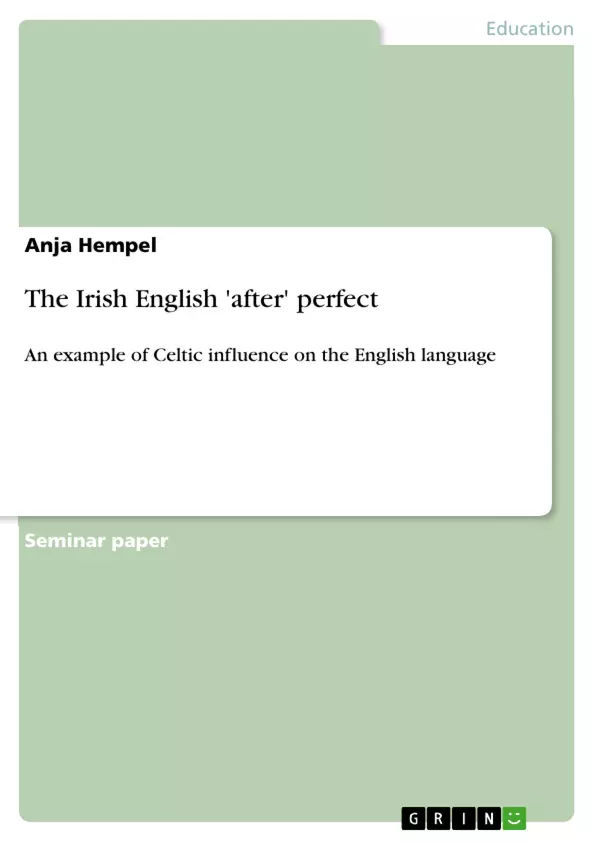The development of different regional varieties of English is an important field of research in historical linguistics. A multitude of theories explain the innumerable differences in pronunciation, vocabulary and grammar that exist within the English speaking world. An important external reason for the great linguistic variation making English a ‘world language’ are the influences from foreign languages that the English language absorbed in language contact situations.
The only language contact which had been for a long time regarded as quite ‘unproductive’, except from some marginal loan words, is that of English and Celtic in the British Isles. Therefore, it was excluded from serious linguistic research up to the 20th century. Modern investigations finally unveiled that the long and close coexistence had, of course, a remarkable impact on all British varieties in the areas of syntax and phonology, too (Filppula et al. 2008: 1f.).
The aim of my paper is to reconstruct the linguistic development during the contact situation between Irish Gaelic (one variety of Celtic) and English on the basis of one selected grammatical feature, namely the after perfect construction in their generated contact variety: Irish English (also Hiberno-English, Anglo-Irish).
After giving some general information on formation and usage of the rare grammatical construction, I will prove the after perfect construction being a result of the English-Celtic contact situation in Ireland. In that respect, I will look at interesting aspects of scholarly debates concerning the language shift, resulting in the Irish English variety as it is spoken today.
Inhaltsverzeichnis (Table of Contents)
- Introduction
- Terminology
- The perfect
- The Hiberno-English perfects
- The after perfect
- Formation
- Usage
- The origins of the after perfect
- Contact situation - language shift
- Historical background
- The transfer of the after perfect construction
- Reduction of the functional range of the after perfect
- Contact situation - language shift
- Conclusion
Zielsetzung und Themenschwerpunkte (Objectives and Key Themes)
This paper aims to investigate the linguistic development of the after perfect construction in Irish English, a grammatical feature arising from the contact between Irish Gaelic and English. The author explores the historical background and the influence of Irish Gaelic on the formation and usage of the after perfect.
- The formation and usage of the after perfect construction in Irish English
- The role of language contact in the emergence of the after perfect
- The impact of Irish Gaelic on the structure and function of Irish English
- The historical context of English language acquisition in Ireland
- The sociolinguistic factors influencing the distribution of the after perfect
Zusammenfassung der Kapitel (Chapter Summaries)
The introduction provides an overview of the research on regional varieties of English, emphasizing the influence of foreign languages on English in contact situations. It highlights the unique impact of Celtic languages on British English, specifically focusing on the after perfect construction in Irish English. The chapter on terminology defines the 'perfect' aspect and clarifies the distinctions between different perfect forms used in Irish English, particularly the resultative perfect and the immediate perfect, which the after perfect exemplifies.
The chapter on the origins of the after perfect explores the historical contact situation between Irish Gaelic and English in Ireland. It delves into the historical background, including the arrival of English settlers and the subsequent language shift that led to the emergence of Irish English. The chapter concludes by outlining the sociolinguistic factors that have influenced the distribution of the after perfect, emphasizing its connection to Irish immigration and missionary activities in Newfoundland and Cameroon.
Schlüsselwörter (Keywords)
The core concepts explored in this paper include Irish English, after perfect construction, Celtic influence, language contact, language shift, Irish Gaelic, historical linguistics, sociolinguistics, and bilingualism. These keywords illuminate the interdisciplinary nature of the research, focusing on the intersection of historical linguistics, sociolinguistics, and the impact of language contact on language development.
Frequently Asked Questions
What is the 'after' perfect in Irish English?
The 'after' perfect is a rare grammatical construction used in Irish English (Hiberno-English) to express a recently completed action, such as "I am after eating my dinner."
How did the 'after' perfect construction originate?
It is a result of language contact between Irish Gaelic and English, where structures from the Gaelic language were transferred into the English spoken in Ireland.
What is the difference between Hiberno-English and Anglo-Irish?
Both terms refer to the variety of English spoken in Ireland, often resulting from the historical shift from Irish Gaelic to English.
Why was the Celtic influence on English ignored for a long time?
Until the 20th century, language contact between English and Celtic was regarded as unproductive, with research focusing only on marginal loan words rather than syntax.
In which other regions can the 'after' perfect be found?
Due to Irish immigration and missionary activities, traces or influences of this construction can be found in Newfoundland and parts of Cameroon.
- Arbeit zitieren
- Anja Hempel (Autor:in), 2009, The Irish English 'after' perfect, München, GRIN Verlag, https://www.hausarbeiten.de/document/168089


